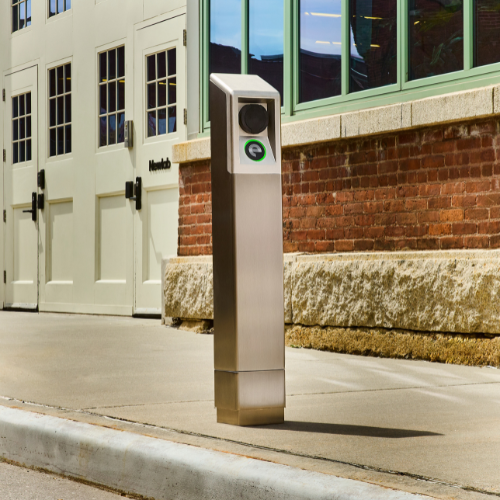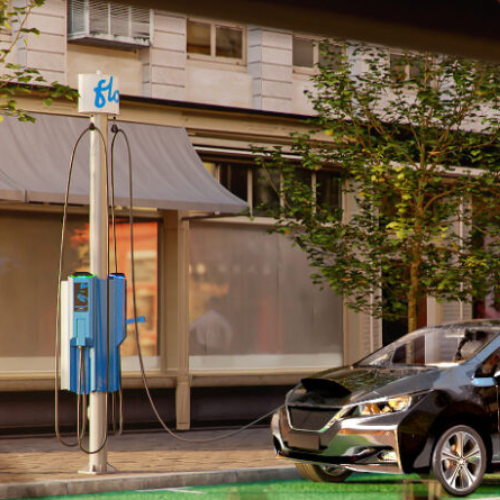Curbside EV Charging
The City is installing electric vehicle (EV) charging ports at curbside locations throughout the city. In addition, the City is partnering with private companies to install and operate EV charging ports, increasing the number of EV charging ports available to the public.
Overview
Transportation is responsible for one-third of the emissions in Boston. We're focusing on policies that support public transportation, walking, biking, and sharing rides. At the same time, we want to encourage people who drive a car to switch to electric vehicles.
Our new curbside charging stations will:
- Help more Bostonians charge their electric vehicles, especially those without private parking or access to a driveway or garage.
- Test different models of providing EV charging: some will be owned and run by the City, and others by private companies at no cost to the City
- Keep up with the growing number of electric vehicles by providing the needed charging infrastructure.
Some of these stations will be owned and operated by the city, while others will be public-private partnerships. These two different approaches will help us achieve our goal of having every Boston resident live within a 5-minute walk of an EV charging station.
Model 1: License the Right-of-Way (public/private partnership)
- Our two (2) vendors, itselectric and Greenspot, will install and operate these stations. These will be no cost to the City.
- The City has a say on how these stations will be operated, and what fees are charged.
- These stations are low profile, minimizing the visual and physical impact on sidewalks.
-
If you own a building – residential or commercial – anywhere in the city, join its electric's waitlist to become a property partner and be the first to solve the charging gap in your neighborhood (while earning passive income every month). Learn more here.
-
To learn more about Greenspot in Boston, see planned locations, and suggest locations, see this link.
Model 2: Public Ownership at City Assets
- The City is installing over curbside electric vehicle (EV) charging ports at more than two dozen locations throughout neighborhoods.
- Our vendor, Better Together Brain Trust in partnership with Flo, will be handle the hardware, installation, and maintenance of these stations.
- The Flo charging stations are designed for curbside use, up to 19.2kW an hour.
- Each location will have 4 charging ports.
- Majority of these locations are adjacent to public amenities, including parks, playgrounds, libraries, and within walking distance of commercial areas; except for where residents have requested, no stations are located adjacent to residential property.
ALL CITY-OWNED EV CHARGING STATIONS (INCLUDES CURBSIDE AND MUNICIPAL LOTS)
The City of Boston is in the process of installing more Level 2 and Level 3 electric vehicle charging stations at various sites, including municipal lots and curbside locations. Once approved by local utilities, the curbside charging station locations will be incorporated into this map.
List of Locations (Coming Soon)
- Near Almont Playground, Mattapan
- Near Billings Field, West Roxbury
- Near Beauford Playground, Roxbury
- Near Puddingstone Garden, Dorchester
- Near Hemenway Playground, Dorchester
- Near the Erie-Ellington Playground, Dorchester
- Near Healy Field, Roslindale
- Near North Street Park, North End
- Near the Honan-Allston Library, Allston
- Near Ross Playground, Hyde Park
- Near the Charlestown Navy Yard, Charlestown
- More sites to come!
Site Selection
Learn more about the site selection process for the City-owned and operated EV charging stations.
Frequently Asked Questions
FAQ'SThe demand for EV charging is growing. Most EV charging occurs at home, though many residents do not have access to a private parking space and rely upon on-street public parking. To allow residents the opportunity to own an electric vehicle, and to reduce our greenhouse gas emissions, the City is investing in publicly accessible EV charging stations.
The City owns the parking spaces that are part of this curbside program. Any parking spaces that are not owned by the City were not explored for this program.
The curbside parking spaces will be first come first serve with a 4 hour limit. EVs that are parked but not actively charging in these spaces will receive an overtime fee for each hour they are parked over the limit.
No. The 4-hour limit does not apply overnight. The signage will indicate ‘No Limit 10pm-8am’ or ‘No Limit 6pm-8am’ depending on existing parking enforcement.
For the City owned and operated stations, the vehicle owner will pay the cost of electricity: $0.35 per KwH.
Yes, this is just the first phase of installations. The City is also expanding EV charging in municipal parking lots: in 2024 the City will add eight (8) Level III DC fast chargers and 32 Level II ports to municipal lots. The City is also partnering with two private operators to install more EV charging stations on public property, including curbside. You can view a list of all City owned and operated EV Charging Stations here.
The City of Boston aims to have all residents within a 5-minute walk from an electric vehicle charger by 2030.
The installation of electric vehicle charging stations supports the following specific goals in addition to the broader agenda set forth by the City’s electric vehicle program, Recharge Boston, and the 2019 Climate Action Plan Update:
- Ensure equitable access to EV charging benefits within Boston’s environmental justice communities (including cleaner air, lower long-term vehicle costs.)
- Evaluate the appropriate balance of LVII and LVIII charging infrastructure needed to meet Boston’s charging demand, given existing infrastructure, available space, and funding opportunities and constraints.
- Demonstrate near-term action through the construction of demonstration projects that are operational in multiple neighborhoods before the end of 2024.
- Position Boston for scaled deployment of a publicly-accessible EV charging network through the deployment of these near-term demonstration projects and the preparation of additional shovel-ready future project sites eligible for federal funding.
- Understand public attitudes towards dedicating space for EVs in public space, acceptable levels of convenience, and consumer preferences between different EV charging ownership models.
You can learn more by visiting our site selection storymap.
The City would like to maintain most of the parking rules and regulations specific to each location. For example, if the parking spaces are currently Resident Permit Parking, the City would like to keep that. If the parking spaces are currently metered, there may be a surcharge in addition to the cost of charging.
The charging stations will be accessible 24 hours a day 7 days a week, and parking access will be regulated and enforced as ‘No Parking Except for Electric Vehicles While Charging, 4 Hour Limit’
Non-Electric vehicles, electric vehicles parked and not actively charging, and electric vehicles parked beyond the 4 hour time limit can all be ticketed for occupying the spaces.
There will be a to be determined cost of electricity consumed between $0.25 and $0.35 per kWh, and there will be a small overtime fee to encourage vehicles to relocate once their charging session has ended.
You can call 311 or use the 311 app to report electric vehicles that are parked in a space while not actively charging.
These are Flo CoRe+ MAX Level 2 Charging Stations, which use a SAE J1772 charging connector. Most Teslas require a SAE J1772 charging adapter.
These are Flo CoRe+ MAX Level 2 Charging Stations. They have a maximum power output of up to 19.2 kW (80 amps), which is 2.7x faster than a typical level 2 charging station.
No, the charging stations will exist on the curb similar to a parking meter.
To activate a charging session, you can place your card on the reader or select the station in the FLO mobile app and press “Start a session.” See here for the Flo user guide.





